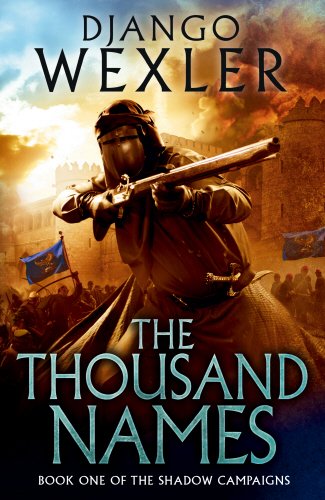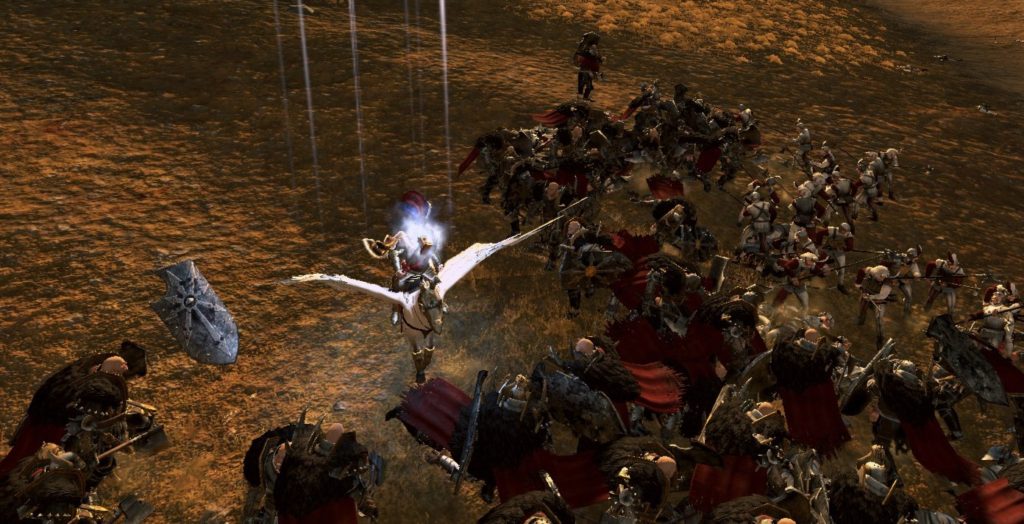Fittingly for such a unique game, Katamari Damacy also had some rather unique music (complete with rolling-themed lyrics). This is one of my favourite pieces, smooth and listenable – enjoy!
Month: June 2016
Author Q&A: Django Wexler, author of The Thousand Names and The Forbidden Library
 I am pleased to present my first author interview. Django Wexler is the author of the Shadow Campaigns, a “gunpowder fantasy” series where clashing armies echo the French Revolutionary and Napoleonic Wars, while magic-users wage a covert war in the shadows. After reading the first book, The Thousand Names, I was hooked. His other works include The Forbidden Library, a young adult series.
I am pleased to present my first author interview. Django Wexler is the author of the Shadow Campaigns, a “gunpowder fantasy” series where clashing armies echo the French Revolutionary and Napoleonic Wars, while magic-users wage a covert war in the shadows. After reading the first book, The Thousand Names, I was hooked. His other works include The Forbidden Library, a young adult series.
Read on for more:
Hello, and welcome to the site!
I’d like to begin by asking about your journey as a writer. You got started via an interest in table-top RPGs, then wrote a number of novels before bursting onto the scene with The Thousand Names in 2013. How has your writing developed, during and since?
The state of my writing is a very hard thing for me to track from the inside, as it were. The first thing to realize is that I wrote a lot of stuff that never has (or will be) published, so by the time Memories of Empire, my first small-press book, came out, I’d had a lot of practice with trunk novels or fan-fiction. The Thousand Names was another three or four novels later, and close to five years, so it’s quite a jump!
One thing I’ve definitely observed is I’ve lost my taste for grand, over-complicated plots. I had a real yearning all through my gaming years to do something enormously epic in scope, and at one point I actually tried writing it — it was going to be nineteen books long, with huge continental maps and oceans of backstory, and one of those timelines that starts with “0: The Gods Create The World”. Fortunately I was dissuaded after only one novel from going on with it, because it would have been impossible to sell, but the further I come the less I really want to do something like that. I have too many different ideas to spend twenty years on one of them.
However! Nothing is every truly wasted. The whole Shadow Campaigns series actually came from one minor thread that was supposed to be woven into this mega-project, and another thing that I’m working on came from another.
How would you describe your current books? And what can you tell us about the other project that you’re working on?
The Shadow Campaigns is a fantasy loosely based on the Napoleonic Wars. It originally began as a project to do a fantasy retelling of the story of Napoleon Bonaparte, inspired by S.M. Stirling and David Drake’s The General series, which is the story of Belisarius. After I started writing it, though, it changed a lot, so it’s now only very vaguely a historical analogue. I pitched it as “A Song of Ice and Fire with guns” — a military/political fantasy set in the age of muskets and cavalry charges.
As for the next project, I have to remain fairly close-mouthed about it. There are quite a few on the horizon, though! More when I’m allowed to say.
Shield of civilisation: Thoughts on Total Warhammer
 I am the shield that guards the realms of man. When the Vampire Counts marched west into the fragmented, bickering human principalities, it was the recently crowned Emperor, Karl Franz, who came to the rescue. And when the battle hung in the balance, the weary human warriors struggling against the Vampire Count himself, it was the Emperor who charged up on horseback to deliver the final blow.
I am the shield that guards the realms of man. When the Vampire Counts marched west into the fragmented, bickering human principalities, it was the recently crowned Emperor, Karl Franz, who came to the rescue. And when the battle hung in the balance, the weary human warriors struggling against the Vampire Count himself, it was the Emperor who charged up on horseback to deliver the final blow.
When the forces of Chaos swept south and west, razing all before them, it was the Empire that rallied resistance. My first pitched battle against Chaos was Pyrrhic, as charging Chaos monsters trampled my infantry. Only weight of numbers saved the day. I rebuilt, and with help from the free peoples of the world, my new, improved armies – bristling with greatswords, knights, and artillery – defeated the last Chaos hordes.
And finally, when Chaos was no more, and the orcish hordes to the south were beaten back, it was time to settle the final score with the Vampire Counts. An uneasy peace had prevailed in the face of the common enemy, Chaos. Now it was the Vampires’ turn to experience the power of the human war machine. Sandwiched between me to the west, Chaos to the north, and orcs and dwarfs to the south, the Vampires had lost their chance to expand, so my campaign was anticlimactic. My troops swept the Vampires aside, fought off an orc army eager for a rematch, and occupied the last settlement required to win. Victory!
Game of the Year contender. A triumphant fusion of theme and mechanics, Total War: Warhammer is intense, challenging, and often spectacular1. From the early game, when I plotted how to bring a wealthy city-state into the imperial fold, to the mid-game, when I juggled human and inhuman foes, to the late game, when I led a Lord of the Rings-style alliance that saw armies marching from the far corners of the earth to help fight Chaos, Total Warhammer cast me as the star of a fantasy epic about uniting humanity against the coming darkness. This was the experience promised before release, and wow, did the game deliver.
More detailed thoughts below:
- I played on Hard campaign difficulty, Normal battle difficulty. ↩